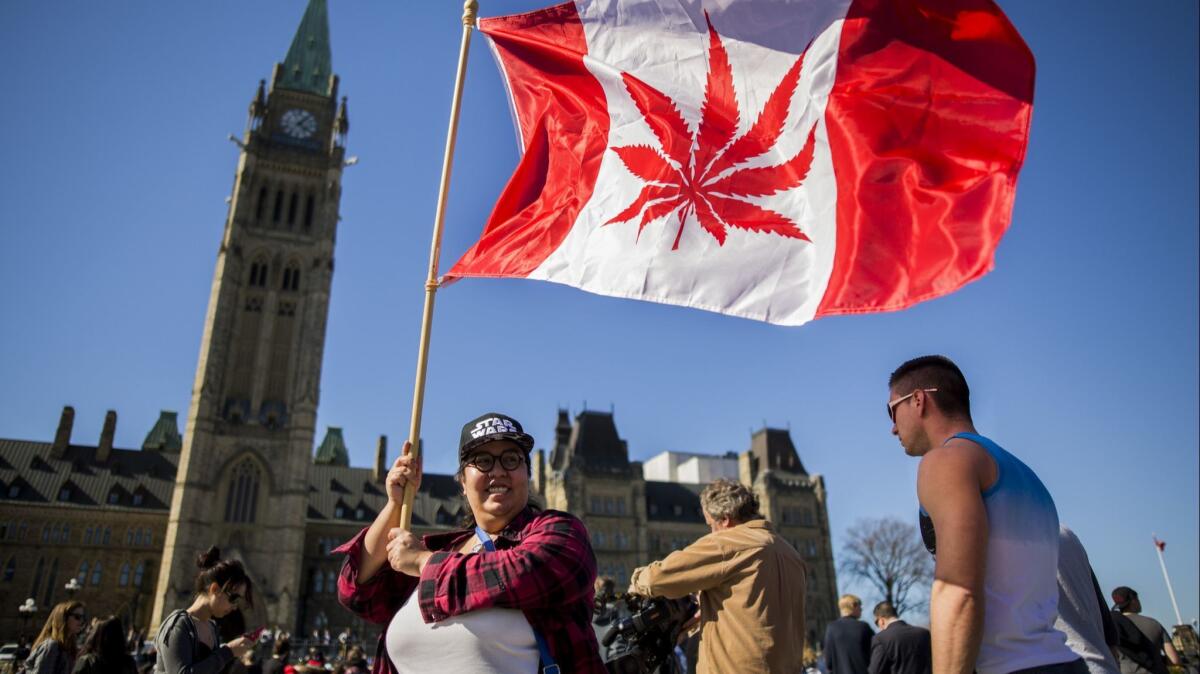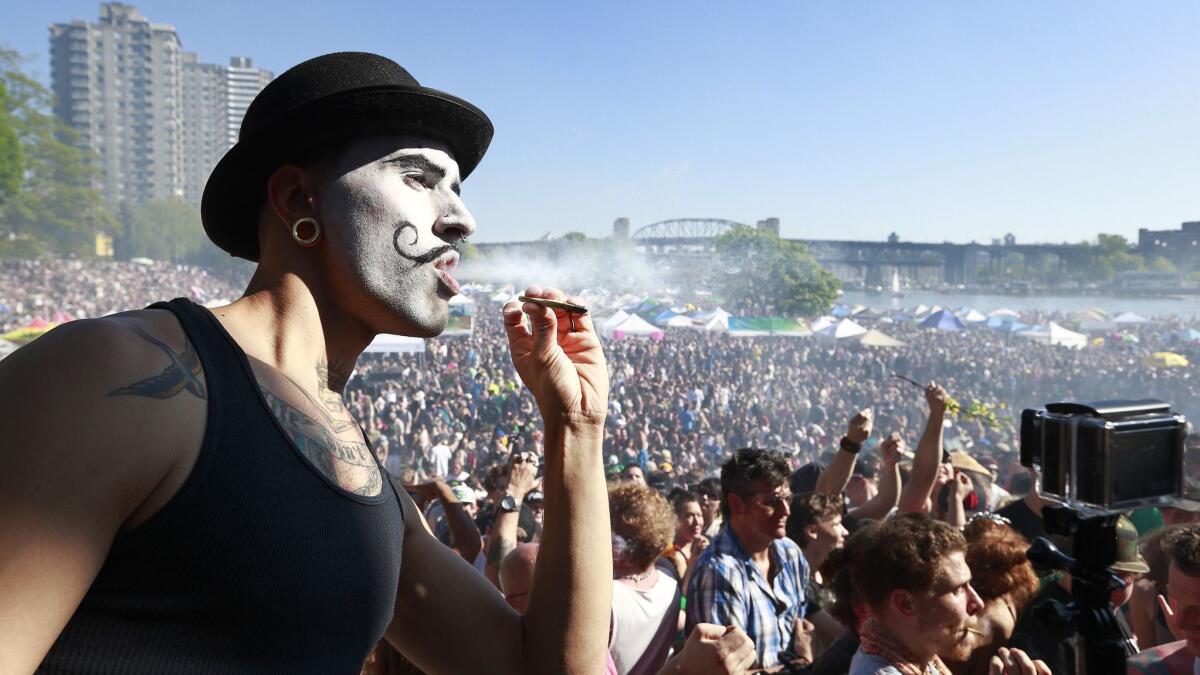Q&A: Canada is about to legalize marijuana. How did that happen? Justin Trudeau, for starters

- Share via
Politicians herald it as transformative. Residents offer resounding support in the polls. Investors see billions of dollars on the horizon.
When Canada legalizes marijuana on Oct. 17, it will join Uruguay as the only countries to allow recreational cannabis nationwide. The South American country became the first in 2013.
The effort, years in the making, is unlike the piecemeal approaches to marijuana legalization that have been passed in the United States and the Netherlands. For pot proponents around the world, Canada’s implementation of legal marijuana is being closely watched.
Here’s a glimpse at how the country has arrived on the cusp of legalization.
OK, when did this pro-legalization push begin?
It started nearly five years ago as Justin Trudeau campaigned for leadership of his Liberal Party.
“I’m in favor of legalizing it,” Trudeau told supporters in British Columbia in early 2013 when asked about marijuana prohibition. “Tax it, regulate. It’s one of the only ways to keep it out of the hands of our kids, because the current war on drugs, the current model is not working.”
Trudeau’s pro-legalization message continued as he assumed leadership of the Liberal Party and then into Canada’s 2015 federal election. He urged Canadians to look south at how legalization was working in Colorado and Washington state, where, in 2012, voters were the first in the United States to pass legalization measures.
“The fact of the matter is our current approach on marijuana … is failing in two primary ways. The first one is it is not protecting our kids from the negative impacts of marijuana on the developing brain,” Trudeau said as he campaigned in January 2014. “Secondly, we are funneling millions upon millions of dollars each year into organized crime and criminal gangs. We do not need to be funding those organizations.”
What happened when Trudeau became prime minister ?
A committee, with Trudeau’s support, was created in Parliament to explore the issue of legalization. The panel, known as the Task Force on Cannabis Legalization and Regulation, explored, among other things, whether legalizing by province would be better than nationwide legalization. Ultimately they decided on the latter.
In April 2017, the Cannabis Act was introduced in Parliament. It allowed for the sale and possession of up to an ounce of marijuana for anyone over the age of 18. Each of Canada’s 10 provinces and three territories, however, are responsible for setting up a system to regulate legal sales. (Medical marijuana has been allowed in Canada since 2001.)
The Cannabis Act passed Parliament this June. At the time, Trudeau announced it would take effect Oct. 17.
How is the legal recreational system going to work in Canada?
It’ll be different based on province. While the Cannabis Act makes marijuana legal nationwide, provinces have set up different regulatory systems.
Some provinces will have only government-run dispensaries, while others will have a mix of government and private dispensaries. A majority of the provinces will allow online sales — yes, Canadians will be able to order cannabis on the internet and have it delivered through the mail.
Alberta, for example, will allow privately run dispensaries — like the ones you might see in Denver or Los Angeles — while the government will oversee online sales. Meanwhile, in Nova Scotia, marijuana will be sold alongside alcohol at stores now run by the Nova Scotia Liquor Corp. And in Ontario, the most populated province, the government has created the Ontario Cannabis Retail Corp., which will be a wholesaler to private retail stores.
Public support in each province is high. To the south, the Pew Research Center places support in the United States for nationwide legalization at about 60%.

Are big sales expected?
Yes. The financial firm Deloitte projects that in the first year, recreational sales could bring in nearly $4 billion in sales. Legal marijuana in the country will have an excise tax of 10% on the product price, or $1 per gram, whichever is higher. Each province will also apply its own sales taxes.
How does this differ from the United States?
Although members of Congress, mostly Democrats, have floated the idea of federal legalization, it has not gained traction. Last year, Democratic Sen. Cory Booker of New Jersey introduced legislation aimed at ending federal prohibition on marijuana. To date, it’s stalled in the Senate.
However, movement on legalization remains active at the state level.
So far, nine states — Colorado, California and Massachusetts among them — have legalized marijuana, mainly through ballot measures. (Vermont is the only state to do so through its Legislature.) This fall, two more states — Michigan and North Dakota — will have ballot measures calling for the legalization of recreational marijuana.
What have U.S. government officials said about Canada legalizing?
Not much. Marijuana in the United States is still listed as a Schedule I drug — the same classification as heroin.
Trump administration officials have not weighed in on Canada’s effort; some, however, such as Atty. Gen. Jeff Sessions, continue to voice opposition to legal sales in the United States. Last year, Sessions expressed his disapproval of legal pot.
“I am definitely not a fan of expanded use of marijuana,” Sessions said. (In 2016, he characterized marijuana as a “very real danger.”)
Cannabis proponents, meanwhile, have lauded Canada’s legalization as a seismic shift.
Steve Hawkins, executive director of Marijuana Policy Project, a group dedicated to ending marijuana prohibitions, said, “Canada is demonstrating how marijuana prohibition can be ended at the federal level and replaced with a system of regulated production and sales.
“It sets a strong example for the U.S. and other countries around the world, which will have the opportunity to learn from its experience,” Hawkins said.
More to Read
Sign up for Essential California
The most important California stories and recommendations in your inbox every morning.
You may occasionally receive promotional content from the Los Angeles Times.











